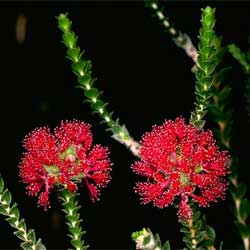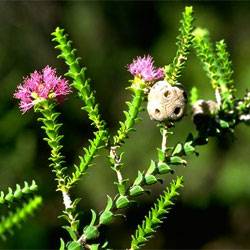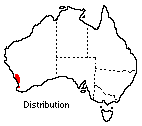Regelia ciliata
 |
 |
Regelia ciliata is a small ornamental shrub which closely resembles Melaleuca and Beaufortia. It is included in the large family Myrtaceae. The genus Regelia contains five species all of which are confined to the south-west of Western Australia.
 Regelia
ciliata grows naturally in low-lying sand flats which often become waterlogged
in winter. However, unlike many Western Australian species which do not adapt
readily to the soils and weather patterns of eastern Australia, R. ciliata will grow easily in most situations. It has a rigid spreading habit, growing
to a height of 1.3 m to 1.5 m across with paper-like bark covering the stems.
The small heart-shaped leaves lie close to the stems and are attractively arranged
in opposite pairs.
Regelia
ciliata grows naturally in low-lying sand flats which often become waterlogged
in winter. However, unlike many Western Australian species which do not adapt
readily to the soils and weather patterns of eastern Australia, R. ciliata will grow easily in most situations. It has a rigid spreading habit, growing
to a height of 1.3 m to 1.5 m across with paper-like bark covering the stems.
The small heart-shaped leaves lie close to the stems and are attractively arranged
in opposite pairs.
The grey-green colour of the foliage provides a pleasing contrast to the mauve flowers which are produced over a prolonged period. The flowers are borne in dense heads 20-50 mm across at the ends of short branchlets. Stem growth continues through the flowers during or after flowering. The grey capsular fruits are fused together in roughly globular clusters around the branches and remain on the plant for long periods.
Regelia ciliata is extremely hardy and is easily propagated from seed or cuttings. The fine seed is soon shed if the fruit is placed in a paper bag in a warm place. Seed germinates readily but plants take a number of years to flower. Plants grown from cuttings develop quickly and can produce flowers the following year. Tip cuttings taken in March/April produce roots within six weeks. Treat the cuttings with a suitable cutting hormone. This versatile plant will grow in full sun or shade, in damp or dry conditions. It responds well to periodic light pruning for shaping and to encourage bushiness. The plant should be kept well mulched and treated with a complete fertiliser in spring and autumn.
Text by Effie Mullins, ANBG (1989)
Name meaning: Regelia ciliataRegelia - in honour of Eduard August von Regel (1815-92), superintendent of the botanic garden at St Petersburg, Russia ciliata - from Latin, fringed with fine hairs (the leaves are hairy). |
![An Australian Government Initiative [logo]](/images/austgovt_brown_90px.gif)

